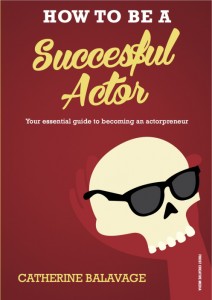The daughter of a friend of mine is in her second year at drama school. She’s good: can sing, can dance, can act – particularly in comedy. So, she has it all? Trouble is, so do so many of the rest of her year group. And so do all of those other aspiring actors in all those drama schools across the country. She’s beginning to ask how she can show she’s different, that she deserves to be remembered from one audition to the next. How she can avoid annoying someone whose off hand influence can close as well as open doors for her?
 I’m going to give her a copy of this book. It may be the single most useful thing I ever do for her. How To Be a Successful Actor: Becoming an Actorpreneur by Catherine Balavage is one of those practical, down-to-earth guides which doesn’t try to hide the obstacles and difficulties of choosing an actor’s life but does give solid and sensible, practical, advice on making the best impression and avoiding the worst pitfalls. Equally valuably, Balavage makes suggestions for networking, for working with others to help each other through teamwork (e.g. helping film each other’s showreels), working for nothing except getting your name out there, remembering names, and never, never, never forgetting to say thank you – even when you don’t land the part. She is upfront about the chances of success in acting: ‘Only act if you cannot do anything else. It is the hardest and most competitive industry you can go into. Your chances of success at making a full-time living for the rest of your life are small.’ And then she offers clear and straightforward, practical advice about how to shift the odds just slightly in your favour.
I’m going to give her a copy of this book. It may be the single most useful thing I ever do for her. How To Be a Successful Actor: Becoming an Actorpreneur by Catherine Balavage is one of those practical, down-to-earth guides which doesn’t try to hide the obstacles and difficulties of choosing an actor’s life but does give solid and sensible, practical, advice on making the best impression and avoiding the worst pitfalls. Equally valuably, Balavage makes suggestions for networking, for working with others to help each other through teamwork (e.g. helping film each other’s showreels), working for nothing except getting your name out there, remembering names, and never, never, never forgetting to say thank you – even when you don’t land the part. She is upfront about the chances of success in acting: ‘Only act if you cannot do anything else. It is the hardest and most competitive industry you can go into. Your chances of success at making a full-time living for the rest of your life are small.’ And then she offers clear and straightforward, practical advice about how to shift the odds just slightly in your favour.
This book seems, at first glance, rather plain, with no images and most chapters simply divided into paragraphs with explanatory headings, or questions followed by responses. I like this format. It’s no-frills and underlines the fact that this is a handbook. A ready reference tool which will be highlighted and annotated by anyone who uses it regularly. The pages of useful contacts and Top Tips are invaluable. I also liked the interviews with others in the profession: the replies to questions overlap with each other in ways which reinforce what Balavage has already said. This reinforces my conviction that this author really is writing from experience and passing on advice distilled from her own hard work. Which I really hope my young friend will take.
[Editorial note: Catherine Balavage is an editor of this magazine]


